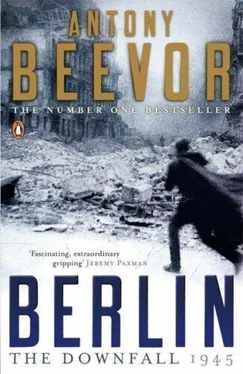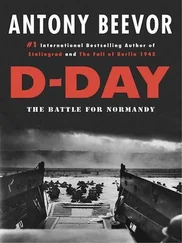Beria and Stalin back in Moscow knew perfectly well what was going on. In one report they were told that ‘many Germans declare that all German women in East Prussia who stayed behind were raped by Red Army soldiers’. Numerous examples of gang rape were given — ‘girls under eighteen and old women included’. In fact victims could be as young as twelve years old. ‘The NKVD group attached to the 43rd Army discovered that German women who had stayed behind in Schpa-leiten had tried to commit suicide’, the report continued. ‘They interrogated one of them called Emma Korn. “On 3 February,” she told them, “frontline troops of the Red Army entered the town. They came into the cellar where we were hiding and pointed their weapons at me and the other two women and ordered us into the yard. In the yard twelve soldiers in turn raped me. Other soldiers did the same to my two neighbours. The following night six drunken soldiers broke into our cellar and raped us in front of the children. On 5 February, three soldiers came, and on 6 February eight drunken soldiers also raped and beat us.” ’ Three days later the women tried to kill the children and themselves by cutting all their wrists, but evidently they had not known how to do it properly.
The Red Army attitude towards women had become openly proprietorial, especially since Stalin himself had stepped in to allow Red Army officers to keep a ‘campaign wife’. (She was known as a PPZh, because the full term, ‘ pokhodno-polevaya zhena’, was so similar to PPSh, the standard Red Army sub-machine gun.) These young women, selected as mistresses by senior officers, were usually headquarters signallers, clerks or medics — young women soldiers who wore a beret on the back of the head instead of a fore-and-aft pilotka.
The lot of a campaign wife was not an easy one when male lust was both intense and indiscriminate. ‘There you are, Vera,’ a young woman soldier called Musya Annenkova in the 19th Army wrote to her friend. ‘See what their “love” is like! They seem to be tender to you but it’s difficult to know what’s inside their souls. They’ve got no sincere feelings, only short-lived passion or love with animal feelings. How difficult it is here to find a really faithful man.’
* * *
Marshal Rokossovsky issued order No. 006 in an attempt to direct ‘the feelings of hatred at fighting the enemy on the battlefield’ and to underline the punishment for ‘looting, violence, robbing, unnecessary arson and destruction’. It seems to have had little effect. There were also a few arbitrary attempts to exert authority. The commander of one rifle division is said to have ‘personally shot a lieutenant who was lining up a group of his men before a German woman spread-eagled on the ground’. But either officers were involved themselves, or the lack of discipline made it too dangerous to restore order over drunken soldiers armed with sub-machine guns.
Even General Okorokov, the chief of the political department of the 2nd Belorussian Front, opposed at a meeting on 6 February what he saw as a ‘refusal to take revenge on the enemy’. In Moscow, the authorities were less worried about rape and murder than about the senseless destruction. On 9 February, Krasnaya Zvezda declared in an editorial that ‘every breach of military discipline only weakens the victorious Red Army… Our revenge is not blind. Our anger is not irrational. In a moment of blind rage one is apt to destroy a factory in conquered enemy territory — a factory that would be of value to us.’
Political officers hoped to adapt this approach to the question of rape as well. ‘When we breed a true feeling of hatred in a soldier,’ the political department of the 19th Army declared, ‘the soldier will not try to have sex with a German woman, because he will be repulsed.’ But this inept sophistry only serves to underline the failure of the authorities to understand the problem. Even young women soldiers and medics in the Red Army did not disapprove. ‘Our soldiers’ behaviour towards Germans, particularly German women, is absolutely correct!’ said a twenty-one-year-old from Agranenko’s reconnaissance detachment. Some seemed to find it amusing. Kopelev was angry when one of his women assistants in the political department made jokes about it.
German crimes in the Soviet Union and the regime’s relentless propaganda certainly contributed to the terrible violence against German women in East Prussia. But vengeance can be only part of the explanation, even if it later became the justification for what happened. Once soldiers had alcohol inside them, the nationality of their prey made little difference. Lev Kopelev described hearing a ‘frenzied scream’ in Allenstein. He saw a girl, ‘her long, braided blonde hair dishevelled, her dress torn, shouting piercingly: “I’m Polish! Jesus Mary, I’m Polish!” ’ She was pursued by two inebriated ‘tankists’ in full view of everyone.
The subject has been so repressed in Russia that even today veterans refuse to acknowledge what really happened during the onslaught on German territory. They will admit to hearing of a few excesses, and then dismiss the subject as an inevitable result of war. Only a few are prepared to acknowledge that they witnessed such scenes. The tiny handful prepared to speak openly, however, are totally unrepentant. ‘They all lifted their skirts for us and lay on the bed,’ said the Komsomol leader in a tank company. He even went on to boast that ‘2 million of our children were born’ in Germany.
The capacity of Soviet officers and soldiers to convince themselves that most of the victims were either happy with their fate, or at least accepted that it was their turn to suffer after what the Wehrmacht had done in Russia, is remarkable. ‘Our fellows were so sex-starved,’ a Soviet major told a British journalist at the time, ‘that they often raped old women of sixty, seventy or even eighty — much to these grandmothers’ surprise, if not downright delight.’
Drink of every variety, including dangerous chemicals seized from laboratories and workshops, was a major factor. In fact, compulsive drinking gravely damaged the fighting capacity of the Red Army. The situation became so bad that the NKVD reported back to Moscow that ‘mass poisoning from captured alcohol is taking place in occupied German territory’. It seems as if Soviet soldiers needed alcoholic courage to attack a woman. But then, all too often, they drank too much and, unable to complete the act of rape, used the bottle instead with appalling effect. A number of victims were mutilated obscenely.
One can only scratch at the surface of the bewildering psychological contradictions. When gang-raped women in Königsberg begged their attackers afterwards to put them out of their misery, the Red Army men appear to have felt insulted. ‘Russian soldiers do not shoot women,’ they replied. ‘Only German soldiers do that.’ The Red Army had managed to convince itself that because it had assumed the moral mission to liberate Europe from fascism, it could behave entirely as it liked, both personally and politically.
Domination and humiliation permeated most soldiers’ treatment of women in East Prussia. The victims bore the brunt of revenge for the Wehrmacht’s crimes during the invasion of the Soviet Union. After the initial fury dissipated, this characteristic of sadistic humiliation became noticeably less marked. By the time the Red Army reached Berlin three months later, its soldiers tended to regard German women more as a casual right of conquest than a target of hate. The sense of domination certainly continued, but this was perhaps partly an indirect product of the humiliations which they themselves had suffered at the hands of their commanders and the Soviet authorities as a whole. ‘The extreme violence of totalitarian systems,’ wrote Vasily Grossman in his great novel Life and Fate, ‘proved able to paralyse the human spirit throughout whole continents.’
Читать дальше











